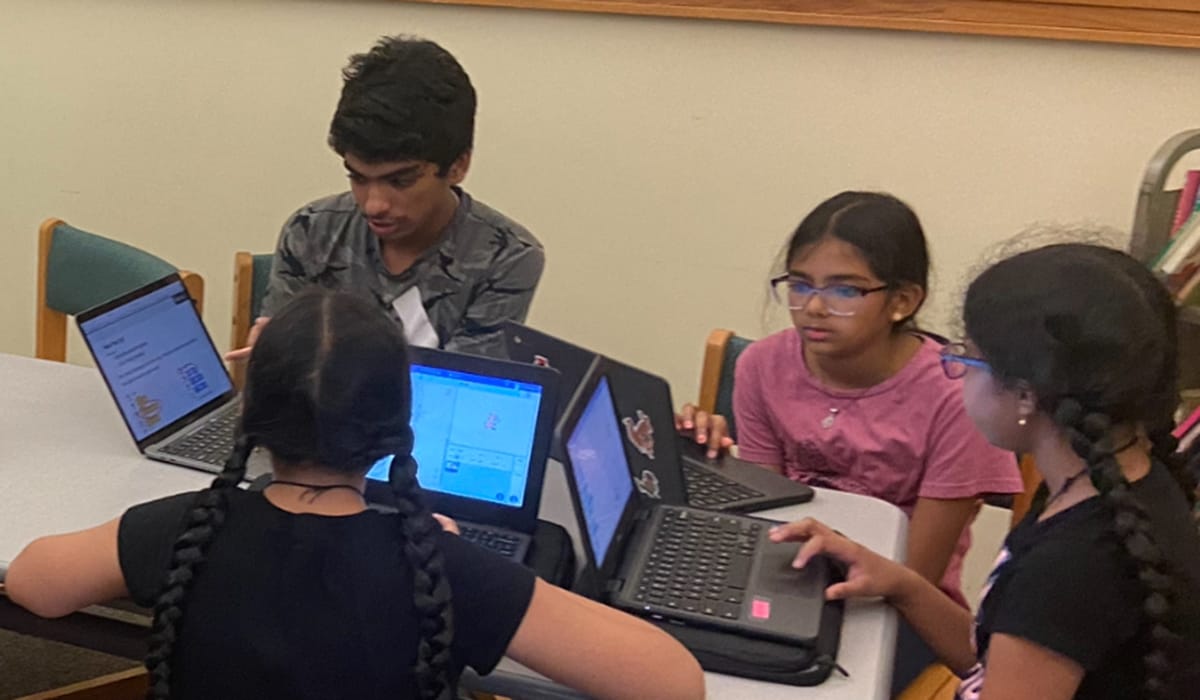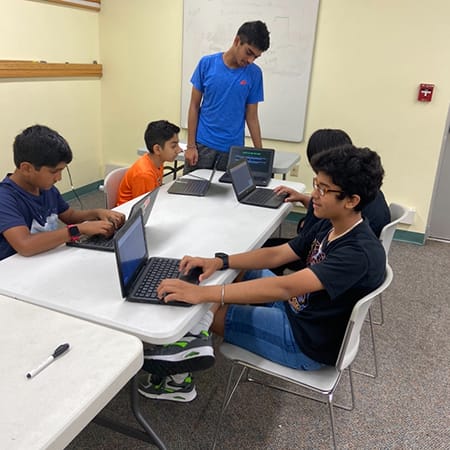Empowering Future Innovators by Expanding Computer Science Education

Meet Daily Point of Light Award honoree Sanjit Kakarla. Read his story, and nominate an outstanding volunteer or family as a Daily Point of Light.
Recognizing a critical gap in computer science education in his community, Sanjit Kakarla launched a movement to spark interest and accessibility in coding for students of all ages. Beginning with a school coding club to assist peers with their computer science coursework, Sanjit expanded his outreach to elementary school students, teaching CS fundamentals and improving digital literacy outside the classroom. His early efforts laid the foundation for larger-scale initiatives, including summer boot camps with local library systems that reached 240 students over just 10 weeks.
Driven by the success of these programs, Sanjit founded The CodeConnect Foundation, now known as Student Code Alliance, a nonprofit organization with branches in 50 states and global reach in countries like Rwanda, Bangladesh and Kenya. Through in-person and online workshops, the organization has educated over 4,300 students, providing $19,000 in free tutoring since its inception. The nonprofit also collaborates with community groups like the Indian American Cultural Association to offer personalized tutoring, ensuring that computer science education is accessible to diverse populations across the United States and beyond.
One of Sanjit’s standout contributions is his development of an open-source curriculum available in both English and Spanish. Covering five programming languages, this curriculum equips students to learn foundational coding skills and pursue passion projects that address real-world social issues. Sanjit’s innovative teaching approach not only builds technical skills but also inspires students to think critically about how technology can drive social change. From app development to data-driven solutions, these projects empower students to harness coding for meaningful impact.
As the president of Student Code Alliance, Sanjit oversees 68 branches, leads a team of over 300 tutors and managers, and dedicates 20-30 hours each month to tutoring and organizational growth. His vision and dedication have transformed computer science education into an inclusive and dynamic field for thousands of students. By bridging educational gaps and fostering creativity, Sanjit is paving the way for the next generation of tech innovators.

Tell us about your volunteer role.
My volunteer role consists of founding and leading the Student Code Alliance (formerly CodeConnect Foundation) community organization, motivating students of all ages and backgrounds to create socially impactful code projects and mobilizing multilingual code education. As someone always passionate about STEM and computer science, throughout my academic career, I’ve sought opportunities to learn about these fields from online lecture videos led by professors. Although I thought these videos were helpful, I quickly recognized that for students aiming to learn to code, the difficult jargon, lack of personalization and applicability to a learner’s life – plus the fact that most of these resources were paid – made it clear that youth programming education needed an upgrade.
Upon spearheading this organization and serving as the founder and president of Student Code Alliance, I have worked alongside a team to develop a socially-focused curriculum with over 50 lessons in five programming languages in English and Spanish. The specialty of our organization is that rather than teaching students to code to eventually pass a test, we teach over a period of 10 weeks, allowing students to gain a love for specific programming languages and develop a project that meaningfully impacts society at the end of the session.
Initially, I worked with libraries through school clubs to organize free, in-person summer coding camps for passionate students township-wide. As these camps began to gain traction and many other high schoolers statewide began to recognize this issue behind code education, our organization began expanding to over six cities within New Jersey. Within a year, we have seen significant expansion with branches in all 50 US states and five countries including Bangladesh and Rwanda, ultimately impacting 4,300+ learners.
Why is this issue so important to you?
This issue is so important to me because I’m a strong believer in the idea that education needs to become more accessible to individuals of all backgrounds. As someone who’s seen the difficulties of traditional computer science educational resources and their inability to effectively teach students, I’ve recognized that educational equity must be made a priority for everyone. I want anyone who is interested in learning how to code and understanding how the technology that governs their daily lives works, to have the opportunity to broaden their horizons and learn for the sake of learning!
In second grade, I personally attended numerous tutoring programs at school and at local libraries, and I was amazed that these volunteers were high-school students. I’ve always admired how these volunteers dedicated their time to sit down with me and help me answer homework problems I was initially struggling on. Reflecting on it, these experiences taught me the impact of volunteerism in fostering educational equity.
What inspired you to get started with this initiative?
Once I joined high school, I was very fortunate to take advantage of the numerous computer science courses my high school offered in VisualBasic, Java and Python. Taking the introductory CS course as a freshman, I quickly recognized that despite these courses, there was no place where students could receive mentorship and join a larger community of computer science enthusiasts. I wanted students to understand the larger implications of what they were learning in class and have the opportunity to innovate outside of the classroom alongside peers and friends. The CS classes at my school helped me learn a variety of ways to effectively teach STEM topics, and eventually, I formed educational mentorship student-led organizations leading outreach activities that eventually grew into the Student Code Alliance organization.
What are your long-term plans or goals for the organization?
Currently, we are in the process of hosting a significant hackathon, MindfulnessHacks, which will allow students passionate about CS to collaborate and build software to boost student mental health, such as chatbots that lead mindfulness breathing exercises. In the future, we hope to host larger coding competitions surrounding other socially relevant topics, teaching students that what they are learning truly matters.
Our open-sourced curriculum can be simply requested from our organization. We hope to use our curriculum to assist and form partnerships with other computer science nonprofits just starting up. In many states, we are now looking to start multiple branches to create a greater network of Student Code Alliance globally. With topics in ethical-AI becoming more and more relevant in our digital world, we are developing additional courses to our curriculum on navigating AI ethically, alongside topics such as Blockchain and Machine Learning.
What’s been the most rewarding part of your work?
Two years ago, I led a summer camp as part of this organization, inviting K-8 members of my local community to learn very basic computer science skills. As I worked with a highly driven team of tutors to lead this summer camp, I was surprised to see these students presenting unique games, such as a basic PacMan recycling-promoting game after only 10 weeks of weekly camp. This experience taught me that students will go the extra mile to innovate when they are taught in a way that encourages creativity.
What have you learned through your experiences as a volunteer?
My experiences as a volunteer have taught me to take initiative as I’ve collaborated with numerous organizations such as libraries and other computer science nonprofits. Working with these organizations has taught me the importance of carefully planning logistics before a collaboration and effectively communicating.
Why is it important for others to get involved with causes they care about?
Everyone must recognize that they can make a serious positive impact on causes they care about as long as they break that initial barrier of hesitance. Working in the community helps individuals learn their skill sets and what they truly care about, which will lead to improvements in various skills including communication. On top of fostering personal growth, getting involved with causes locally helps individuals create positive, empowering communities.
Any advice for people who want to start volunteering?
Start small with your time commitments and learn what you are truly passionate about. Many people think of volunteering as something very difficult to get into and find. Honestly, try to make volunteering a part of your daily life when you can. There are so many organizations around you that are looking for volunteers to serve and aid their growth. Take advantage of every opportunity – no matter how minor you think these opportunities are – because your efforts truly add up. Finally, volunteer as a way to explore academic fields you are interested in with a community-centered lens.
Do you want to make a difference in your community like Sanjit? Find local volunteer opportunities.
